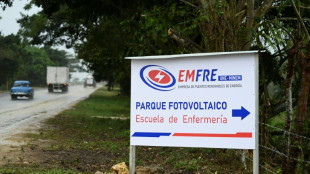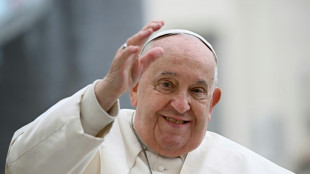
-
 Australia says China has not explained naval live-fire warning
Australia says China has not explained naval live-fire warning
-
On $15 a month, Venezuela's teachers live hand to mouth

-
 Reds boss Kiss hails resilience in 13-try Super Rugby extravaganza
Reds boss Kiss hails resilience in 13-try Super Rugby extravaganza
-
Porn stars: Oscar favorite 'Anora' gets sex work right

-
 Arab leaders meet in Saudi Arabia to hash out Gaza plan
Arab leaders meet in Saudi Arabia to hash out Gaza plan
-
South Africa's Potgieter fires 61 to grab PGA Mexico Open lead

-
 LA prosecutor says opposes new trial for Menendez brothers
LA prosecutor says opposes new trial for Menendez brothers
-
Australia says no live firing seen or heard from Chinese ships

-
 US proposes Ukraine UN text omitting mention of occupied territory: diplomats
US proposes Ukraine UN text omitting mention of occupied territory: diplomats
-
Trump says Zelensky and Putin must 'get together'

-
 AP sues White House officials over denial of access
AP sues White House officials over denial of access
-
Everton boss Moyes doing a better job than me, says Man Utd's Amorim

-
 'See you in court': Trump, governor spar over trans rights
'See you in court': Trump, governor spar over trans rights
-
US stocks tumble on fears of slowdown

-
 Champions Spain fight back in Women's Nations League opener, England held
Champions Spain fight back in Women's Nations League opener, England held
-
M23 pushes deeper in east DRC, UN urges Rwanda forces to leave

-
 Leicester hit historic low in Brentford rout
Leicester hit historic low in Brentford rout
-
LA mayor sacks fire chief over handling of deadly blazes

-
 Suspect arrested after stabbing at Berlin's Holocaust memorial
Suspect arrested after stabbing at Berlin's Holocaust memorial
-
Cuba opens solar park hoping to stave off blackouts

-
 'Super tough' Rublev in third Qatar final, faces Draper for title
'Super tough' Rublev in third Qatar final, faces Draper for title
-
Yankees change facial hair policy to allow 'well-groomed beards'

-
 'History will not forgive' failure to seal pandemic deal: WHO chief
'History will not forgive' failure to seal pandemic deal: WHO chief
-
There's optimism Wembanyama will make strong recovery

-
 Cognac on the rocks: industry seeks French govt help from Chinese tariffs
Cognac on the rocks: industry seeks French govt help from Chinese tariffs
-
Texas measles outbreak reaches 90, mostly unvaccinated

-
 Holders Spain stun Belgium with late comeback in women's Nations League
Holders Spain stun Belgium with late comeback in women's Nations League
-
Man badly wounded in suspected stabbing at Berlin's Holocaust memorial

-
 Ex-Trump aide's 'Nazi ideology' salute sparks French party leader's protest
Ex-Trump aide's 'Nazi ideology' salute sparks French party leader's protest
-
Man found guilty of trying to kill Salman Rushdie

-
 Man badly wounded in assault at Berlin's Holocaust memorial: police
Man badly wounded in assault at Berlin's Holocaust memorial: police
-
USA needs travel reforms to cope with mega sports events: report

-
 World champion Brignone storms to Sestriere giant slalom
World champion Brignone storms to Sestriere giant slalom
-
'Unknown little Englishman' Sherratt hoping to reverse Welsh fortunes

-
 Pope not out of danger, doctors say, amid questions over future
Pope not out of danger, doctors say, amid questions over future
-
Christie's first-ever AI sale angers some artists

-
 M23 advances deeper in east DRC as Congolese troops flee
M23 advances deeper in east DRC as Congolese troops flee
-
German flying taxi start-up's rescue deal collapses

-
 Court of Arbitration for Sport rejects Rubiales ban appeal
Court of Arbitration for Sport rejects Rubiales ban appeal
-
S.Africa wants 'inclusive' talks on ending Ukraine war, invites Zelensky

-
 Postecoglou wants Spurs to 'kick on' after turning corner
Postecoglou wants Spurs to 'kick on' after turning corner
-
Rickelton hits century as South Africa rout Afghanistan in Champions Trophy

-
 Ireland expect 'galvanised' hosts, as Wales try to quiet 'outside noise'
Ireland expect 'galvanised' hosts, as Wales try to quiet 'outside noise'
-
French-Lebanese architect to redesign British Museum galleries

-
 Stock markets diverge, oil prices slide
Stock markets diverge, oil prices slide
-
History inspires Darge as Scotland eye five wins in a row over England

-
 'Queen of Pop' Madonna lambasts 'King' Trump
'Queen of Pop' Madonna lambasts 'King' Trump
-
Apple says halting data protection tool for UK users

-
 Rangers boss Clement not distracted by US takeover reports
Rangers boss Clement not distracted by US takeover reports
-
Andreeva defeats Rybakina in Dubai to become youngest WTA 1000 finalist


Nepal community fights to save sacred forests from cable cars
They appear tranquil soaring above Himalayan forests, but a string of cable car projects in Nepal have sparked violent protests, with locals saying environmental protection should trump tourism development.
In Nepal's eastern district of Taplejung, the community has been torn apart by a $22-million government-backed project many say will destroy livelihoods and damage ancient forests they hold as sacred.
Across Nepal, five cable car projects have opened in the past two years -- and 10 more are under development, according to government figures.
Critics accuse the government of failing to assess the environmental impact properly.
In January, protests at Taplejung escalated into battles with armed police, with four activists wounded by gunfire and 21 officers injured.
The protests calmed after promises construction would be suspended, but erupted again this week, with 14 people wounded on Thursday -- 11 of them members of the security forces.
"We were in a peaceful protest but hired thugs showed us kukris (large knives) and attacked us -- and we countered them," protest committee leader Shree Linkhim Limbu told AFP after the latest clashes.
He vowed to continue demonstrations until the project is scrapped.
Around 300,000 Hindu devotees trek for hours to Taplejung's mountaintop Pathibhara temple every year -- a site also deeply sacred to the local Limbu people's separate beliefs.
In 2018, Chandra Prasad Dhakal, a businessman with powerful political ties who is also president of Nepal's Chamber of Commerce and Industry, announced the construction of a 2.5-kilometre-long (1.5-mile) cable car to the temple.
The government calls it a project of "national pride".
- 'Butchering our faith' -
Dhakal's IME Group is also building other cable cars, including the 6.4-kilometre-long Sikles line in the Annapurna Conservation Area, which the Supreme Court upheld.
The government deemed the project a "national priority", thereby exempting it from strict planning restrictions in protected areas.
The Supreme Court scrapped that controversial exemption last month, a move celebrated by environmentalists.
But activists fear the project may still go ahead.
Taplejung is deeply sacred to local Mukkumlung beliefs, and residents say that the clearance of around 3,000 rhododendron trees -- with 10,00 more on the chopping block -- to build pylons is an attack on their religion.
"It is a brutal act," said protest chief Limbu. "How can this be a national pride project when the state is only serving business interests?"
Saroj Kangliba Yakthung, 26, said locals would rather efforts and funding were directed to "preserve the religious, cultural and ecological importance" of the forests.
The wider forests are home to endangered species including the red panda, black bear and snow leopard.
"We worship trees, stone and all living beings, but they are butchering our faith," said Anil Subba, director of the Kathmandu-based play "Mukkumlung", which was staged for a month as part of the protest.
The hundreds of porters and dozens of tea stall workers that support trekking pilgrims fear for their livelihoods.
"If they fly over us in a cable car, how will we survive?" said 38-year-old porter Chandra Tamang.
The government says the cable car will encourage more pilgrims by making it easy to visit, boosting the wider economy in a country where unemployment hovers around 10 percent, and GDP per capita at just $1,377, according to the World Bank.
"This will bring development," said resident Kamala Devi Thapa, 45, adding that the new route will aid "elderly pilgrims".
- 'Massive deforestation' -
The cable cars symbolise Nepal's breakneck bid to cash in on tourism, making up more than six percent of the country's GDP in 2023, according to the World Travel and Tourism Council (WTTC).
Beyond the Pathibhara project, the government's environmental policy is in question -- in a country where 45 percent is forest.
More than 255,000 trees have been cut down for infrastructure projects in the past four years, according to the environment ministry.
"Nepal has witnessed massive deforestation in the name of infrastructure," said Rajesh Rai, professor of forestry at Tribhuvan University. "This will have severe long-term consequences".
Unperturbed, the cable car builder assures his project will create 1,000 jobs and brushes aside criticism.
"It won't disturb the ecology or local culture," Dhakal said. "If people can fly there in helicopters, why not a cable car?"
The argument leaves Kendra Singh Limbu, 79, unmoved.
"We are fighting to save our heritage," he said.
It has split the community, local journalist Anand Gautam told AFP.
"It has turned fathers and sons against each other," Gautam said. "Some see it as progress, others as destruction".
F.Pedersen--AMWN